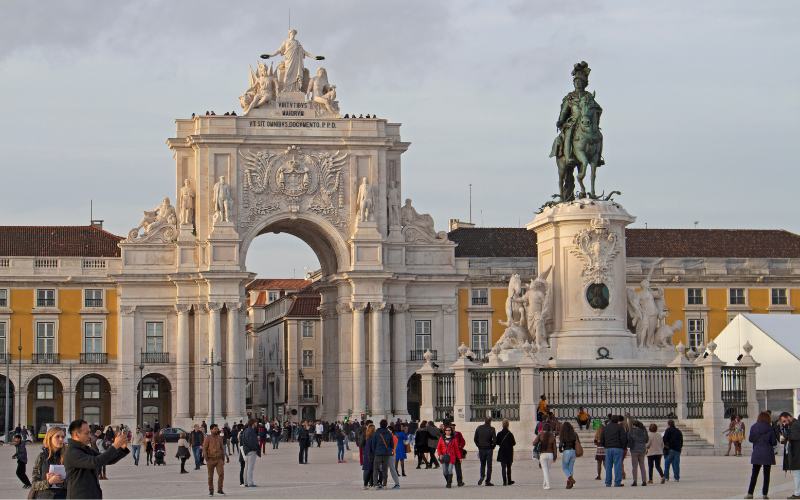Since 2012 till 2024, there have been many changes to the Golden Visa Portugal.
The program is one of the best ways to achieve the longed-for Portuguese citizenship. After all, this type of residence permit allows dual citizenship via a very advatageous residence requirements, only 7 days per year in Portugual.
In addition, it does not require the applicant to work, live, marry a Portuguese or be of Lusitanian descent, making the process less bureaucratic.
However, over the years changes to the Golden Visa have had a direct impact on investors.
In this article we’ll understand what the Golden Visa Portugal is for and why it was created and we’ll explore the main changes to the program from its creation in 2012 until 2024. Check it out!
Why was the Golden Visa Portugal Program created?
The Golden Visa in Portugal was created as a way of attracting foreign investors to the country, with the aim of boosting economic growth.
The program offers residence permits in exchange for investments in Portugal, such as: investment in scientific research, job creation and venture capital investments.
The golden visa is very popular with investors from countries outside the European Union, especially US citizens, Brazilians and Chinese, who seek benefits such as access to residency and, potentially, European citizenship.
When was the Golden Visa created?
The Residence Permit for Investment Activity (ARI) or Golden Visa Program was created in October 2012, through Law 29/12.
Since then, the law has undergone several important changes over the years.
Below, we’ll explain the main changes in detail.
How has the Golden Visa changed over time?
Since its creation there have been several changes to the Golden Visa Portugal, ranging from the creation of new investment modalities to the extinction of some of them.
The main changes were:
2012: Start of the Golden Visa program in Portugal, which offers residency to investors from outside Europe in exchange for significant financial contributions.
2015: Revisions are made to the program to streamline the visa granting process and increase clarity, addressing criticisms about its complexity and slowness.
2017: Addition of alternative investment modalities, such as contributions to venture funds and job creation, expanding the forms of eligibility for the program.
2020: Introduction of limitations for investments in the real estate sector in the Lisbon and Porto regions, with the aim of channeling resources to the interior and to sectors such as culture and innovation.
2022: Implementation of the proposed limitations for real estate investments in the main metropolitan areas, and adjustment to the minimum amounts required for investment.
2023: Removal of real estate investment options and capital transfers from the program, directing the focus towards supporting specific economic sectors.

Which types of investment will still be valid in 2024?
Despite the changes to the Golden Visa Portugal, including the extinction of the investment modalities in real estate and capital transfer, Portugal continues to be one of the countries in Europe that attracts the most investors in the world.
In a strategic move, the Portuguese government has maintained 5 investment modalities for the Golden Visa in 2024:
- Minimum investment of 500,000 euros in scientific research activities;
- Investment of 500,000 euros in a regulated and approved investment fund;
- Investment of 500,000 euros in the creation of a local company, or investment in an existing company, with the creation or maintenance of 5 jobs for a minimum period of 3 years;
- Donation of 250,000 euros in artistic production or maintenance of national heritage;
- Creation of at least 10 jobs.
How can US citizens who wish to invest in a Golden Visa obtain dual citizenship?
Portuguese citizenship via investment in the Golden Visa can be acquired through a 5-year period, in accordance with current legislation in Portugal.
For US citizens who wish to become Portuguese citizens, but do not have Portuguese ancestry and do not even live or work in Portugal, the Golden Visa, by allowing residence in Portugal, is the ideal option for those who have the potential to invest in the country.
To do this, in addition to investing in one of the modalities required by the government, according to the changes in the Golden Visa Portugal, you will need to invest in the country for 5 consecutive years, in most options.
In addition, you need to stay in the country for a minimum of 7 days a year during your 5-year residence permit.
Important: The difference between the Golden Visa and the other Portuguese visas is that it doesn’t require relocation to Portugal, it can be applied for and the applicant can continue to live in USA until they have completed the 5 years for Portuguese citizenship. In other words, the applicant can live in Portugal or USA, and the 5-year period for acquiring Portuguese citizenship will continue to run.
Let’s imagine a scenario in which Peter makes the necessary contributions to a Portuguese investment fund, such as VIDA Fund. In this way, he acquires the right to live, work or study in Portugal for himself and his family through the Golden Visa that requires these investments.
However, if Peter wishes to remain in USA, the period of residence continues to count, until in 5 years he can apply for dual citizenship (Portuguese citizenship by period of residence).
In addition, with the amounts invested, Peter will still receive dividends and returns according to the performance of the assets of the fund he invested in to obtain the Golden Visa.
In short, by acquiring the Golden Visa, Peter guarantees residency in Portugal for the whole family, he will also have the right to obtain dual citizenship in 5 years (even if he doesn’t live in Portugal) and he will also receive a return on his investment.
Conclusion on the changes to the Golden Visa until 2024
The changes to the Golden Visa Portugal over the years have been significant. Although the last change was negative for foreigners interested in investing and living in the country, the outlook for the future is very positive.
Investment funds, for example, continue to be an excellent option for those who were counting on buying real estate, which no longer exists.
Thus, the likely scenario is that the program will continue to exist, as this is one of the most effective ways for the government to attract foreign investment.


